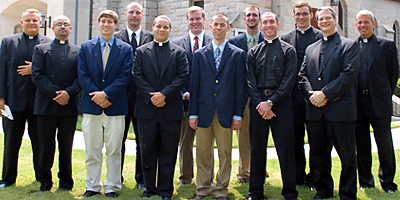
 The faithful are frequently asked to pray for seminarians, but many are in the dark about how the schools operate. Do they live in silence? Do they spend every waking hour in prayer? Is there any time for recreation?
The faithful are frequently asked to pray for seminarians, but many are in the dark about how the schools operate. Do they live in silence? Do they spend every waking hour in prayer? Is there any time for recreation?
The truth is that modern seminaries are much like universities, just with a very strong spiritual emphasis. Because the demands of priesthood are so great, formation of future priests is extremely rigorous, according to an article recently published by Diocese of Charleston’s Office of Vocations.
Levels and distinctions
There are three levels of seminary, and men are assigned depending on their stage of education.
“It’s helpful to know the distinctions, because some people might know a seminarian and wonder: ‘Why is this taking so long, why isn’t he a priest yet?’” said Father Jeffrey F. Kirby, vicar of vocations for the diocese.
College seminary is for men who are completing a college degree and going through required formation to enter major seminary.
Pre-theology is for those who already have a degree, but need to complete the required two years of formation and philosophy before they enter seminary.
The final four years of priestly formation are known as Theology.
“They study all the aspects of theology, the Bible, church teaching, church history and law, the liturgy, sacraments — all those aspects,” Father Kirby said.
Major seminary also includes courses in public speaking, writing, composition, and often humanities classes, including art or music.
Besides academics, daily life at the seminary has group prayer at least twice a day, Mass, meetings with spiritual directors, and pastoral assignments at local parishes.
The major steps
A journey to the priesthood includes several formal steps:
Ministry of Lector (First Theology): proclaim the word of God in a liturgical assembly.
Ministry of Acolyte (Second Theology): assist deacon and priest during Mass.
Admission to candidacy (Third Theology): The bishop formally calls a man to be ordained.
Ordination to transitional diaconate (summer after Third Theology): A man takes promises of obedience and celibacy.
Ordination to priesthood (summer after Fourth Theology).
Men who have special interests they would like to pursue often have to wait until after they are ordained because the theology curriculum itself is so intense.
